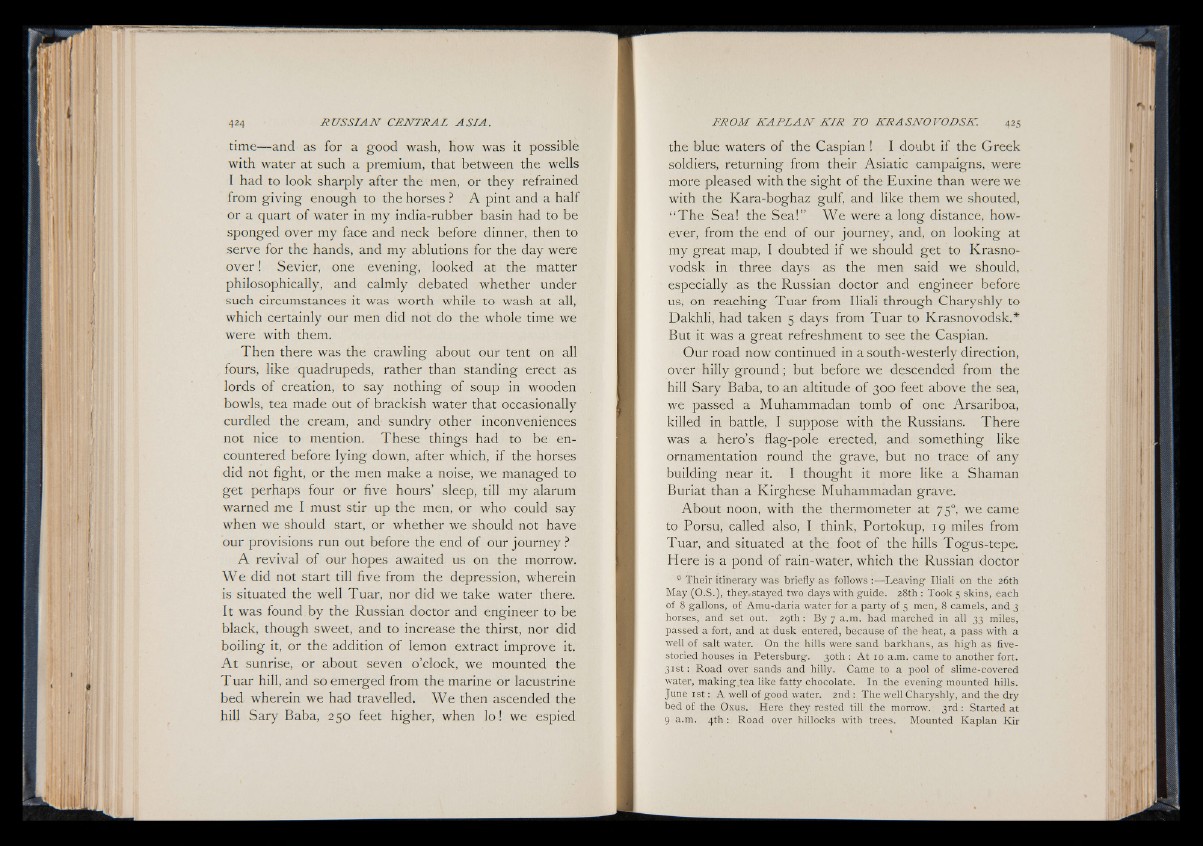
time— and as for a good wash, how was it possible
with water at such a premium, that between the wells
I had to look sharply after the men, or they refrained
from giving enough to the horses ? A pint and a half
or a quart of water in my india-rubber basin had to be
sponged over my face and neck before dinner, then to
serve for the hands, and my ablutions for the day were
o v e r ! Sevier, one evening, looked at the matter
philosophically, and calmly debated whether under
such circumstances it was worth while to wash at all,
which certainly our men did not do the whole time we
were with them.
Then there was the crawling about our tent on all
fours, like quadrupeds, rather than standing erect as
lords of creation, to say nothing of soup in wooden
bowls, tea made out of brackish water that occasionally
curdled the cream, and sundry other inconveniences
not nice to mention. These things had to be encountered
before lying down, after which, if the horses
did not fight, or the men make a noise, we managed to
get perhaps four or five hours’ sleep, till my alarum
warned me I must stir up the men, or who could say
when we should start, or whether we should not have^
our provisions run out before the end of our journey ?
A revival of our hopes awaited us on the morrow.
W e did not start till five from the depression, wherein
is situated the well Tuar, nor did we take water there.
It was found by the Russian doctor and engineer to be
black, though sweet, and to increase the thirst, nor did
boiling it, or the addition of lemon extract improve it.
A t sunrise, or about seven o’clock, we mounted the
Tuar hill, and so emerged from the marine or lacustrine
bed wherein we had travelled. W e then ascended the
hill Sary Baba, 250 feet higher, when lo ! we espied
the blue waters o f the Caspian ! I doubt if the Greek
soldiers, returning from their Asiatic campaigns, were
more pleased with the sight of the Euxine than were we
with the Kara-boghaz gulf, and like them we shouted,
“ The Sea! the Sea!” We were a long distance, however,
from the end of our journey, and, on looking at
my great map, I doubted if we should get to Krasno-
vodsk in three days as the men said we should,
especially as the Russian doctor and engineer before
us, on reaching Tuar from Iliali through Charyshly to
Dakhli, had taken 5 days from Tuar to Krasnovodsk.*
But it was a great refreshment to see the Caspian.
Our road now continued in a south-westerly direction,
over hilly ground; but before we descended from the
hill Sary Baba, to an altitude of 300 feet above the sea,
we passed a Muhammadan tomb of one Arsariboa,
killed in battle, I suppose with the Russians. There
was a hero’s flag-pole erected, and something like
ornamentation round the grave, but no trace of any
building near it. I thought it more like a Shaman
Buriat than a Kirghese Muhammadan grave.
About noon, with the thermometer at 750, we came
to Porsu, called also, I think, Portokup, 19 miles from
Tuar, and situated at the., foot of the hills Togus-tepe.
Here is a pond of rain-water, which the Russian doctor
0 Their itinerary was briefly as follows :—Leaving Iliali on the 26th
May (O.S.), they.stayed two days with guide. 28th : Took 5 skins, each
of 8 gallons, of Amu-daria water for a party of 5 men, 8 camels, and 3
horses, and set out. 29th : By 7 a.m. had marched in all 33 miles,
passed a fort, and at dusk entered, because of the heat, a pass with a
well of salt water. On the hills were sand barkhans, as high as five-
storied houses in Petersburg. 30th : At 10 a.m. came to another fort.
31st: Road over sands and hilly. Came to a pool of slime-covered
water, making.tea like fatty chocolate. In the evening mounted hills.
June 1st: A well of good water. 2nd : The well Charyshly, and the dry
bed of the Oxus. Here they rested till the morrow. 3rd: Started at
9 a.m. 4th.: Road over hillocks with trees. Mounted Kaplan Kir